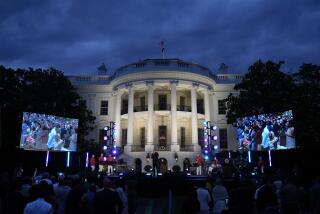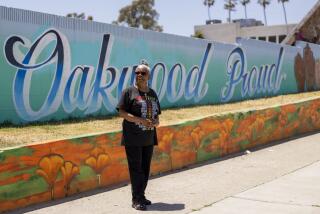Juneteenth Festivities Mark Freedom Delayed
- Share via
SAN FRANCISCO — Black cowboys decked in traditional Old West regalia joined several hundred other marchers Saturday to commemorate Juneteenth, the day in 1865 that slaves in Texas belatedly learned that they were free.
Among the marchers was James Hopkins, 38, a San Francisco truck driver and part-time bull-rider whose horse received cheers and applause as it pranced.
Other marchers included dance troupes, precision drill teams, high school ROTC units and auto enthusiasts driving glistening Corvettes and Mustang convertibles.
“I’ve been doing this for 10 years because this is the day we were freed,” said Eddie Thompson, 72, a retired Navy veteran who was a drill team member for the Shriners Thutmose Temple of San Francisco.
The city’s celebration, one of more than 200 around the nation, is believed to be one of the biggest, according to organizers. Through the weekend, an estimated 50,000 participants are expected at festivities, featuring the parade, ethnic food and entertainment along Fillmore Street in the commercial heart of the city’s Western Addition.
The name Juneteenth comes from the date June 19. On that day in 1865, Maj. Gen. Gordon Granger arrived in Galveston, Texas, carrying news that the Civil War had ended, and with it slavery.
Texas slaves’ freedom came almost 2 1/2 years after President Lincoln signed the Emancipation Proclamation, but the Union could not enforce it in Texas until Granger’s arrival.
Events marking the day have been multiplying across the nation. This year, 12 states, including California, have joined Texas in marking the occasion on the third Saturday in June. Former Gov. Gray Davis signed legislation in July 2002 proclaiming National Juneteenth Freedom Day in California.
The tradition in San Francisco can be credited mostly to Wesley Johnson, a Texas native who brought the idea of the celebration when he moved to San Francisco after World War II, according to Wade Woods, a Juneteenth organizer this year.
Johnson persuaded a number of black organizations to join in the early public celebrations in San Francisco, Woods said. Over time, the sponsors grew and Juneteenth evolved into a major cultural event.
Not all of those in the largely African American crowd watching Saturday’s parade were sanguine about the event.
“They should talk about what happened in our history,” said one woman who identified herself only as Hattee. “I mean, this generation of young people needs to know about what happened [when the slaves were freed] instead of just so much entertainment out here on the street.
“Maybe then they’d get involved in the community instead of just trying to get some guns,” she said, referring to gang activity in the Western Addition, a black and Latino neighborhood.
Nevertheless, the Juneteenth celebrations serve to build self-esteem in African American communities, said Regnaldo Woods, Wade’s brother.
He was particularly proud of the presence of black cowboys in Juneteenth parades. In the 1970s and ‘80s, there was even an inner-city rodeo, Woods said.
“It was like a meteor,” he said. “Kids here in the neighborhood didn’t even know black men were ever cowboys. All they ever saw was white cowboys on TV. It hit them hard and gave them a sense of dignity and hope.”


